Coca Cola 可口可乐公司英文版介绍
- 格式:ppt
- 大小:4.53 MB
- 文档页数:16
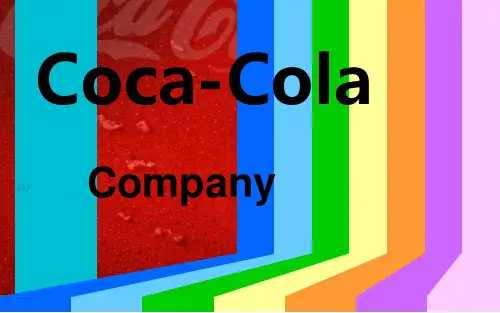
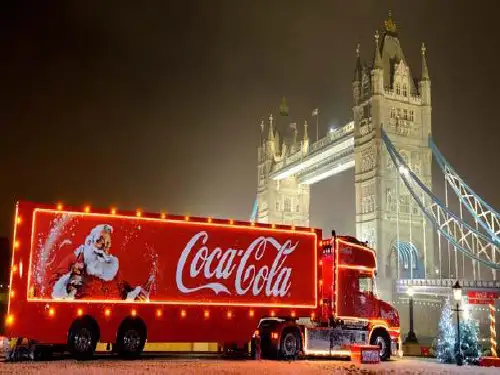
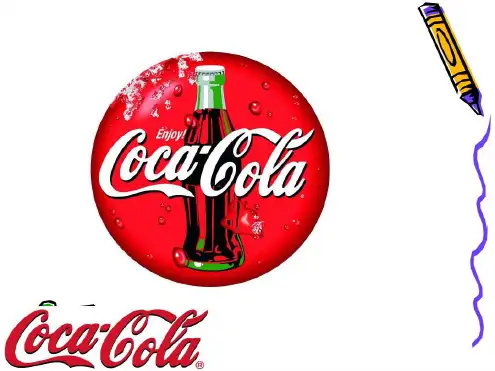
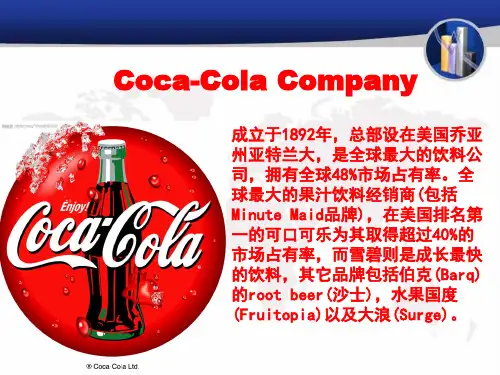
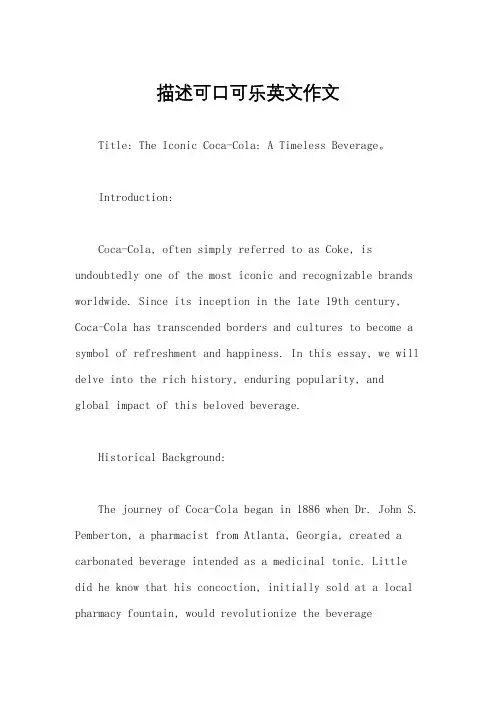
描述可口可乐英文作文Title: The Iconic Coca-Cola: A Timeless Beverage。
Introduction:Coca-Cola, often simply referred to as Coke, is undoubtedly one of the most iconic and recognizable brands worldwide. Since its inception in the late 19th century, Coca-Cola has transcended borders and cultures to become a symbol of refreshment and happiness. In this essay, we will delve into the rich history, enduring popularity, and global impact of this beloved beverage.Historical Background:The journey of Coca-Cola began in 1886 when Dr. John S. Pemberton, a pharmacist from Atlanta, Georgia, created a carbonated beverage intended as a medicinal tonic. Little did he know that his concoction, initially sold at a local pharmacy fountain, would revolutionize the beverageindustry. With its unique blend of flavors, including coca leaf extract and kola nuts, Coca-Cola quickly gained popularity for its refreshing taste.Global Expansion:Over the decades, Coca-Cola expanded its reach beyond the United States, venturing into international markets. Through strategic marketing campaigns and partnerships, the brand became synonymous with American culture and values. Today, Coca-Cola is available in over 200 countries, making it a truly global phenomenon.Cultural Impact:Beyond its commercial success, Coca-Cola has left an indelible mark on popular culture. From its iconic contour bottle design to memorable advertising slogans such as "Open Happiness," the brand has become ingrained in the collective consciousness. Coca-Cola's presence is felt in movies, music, and even art, serving as a symbol of unity and joy.Marketing Strategy:One of Coca-Cola's key strengths lies in its innovative marketing strategies. From sponsoring major sporting events like the FIFA World Cup to leveraging social media platforms, the brand has consistently stayed relevant and engaged with consumers. Through storytelling and emotional connections, Coca-Cola has fostered loyalty among its diverse customer base.Product Diversification:While Coca-Cola's classic formula remains unchanged, the brand has adapted to changing consumer preferences by introducing a wide range of products. From Diet Coke to Coca-Cola Zero Sugar, the company offers options to cater to different tastes and dietary needs. Additionally, Coca-Cola has expanded its portfolio to include non-carbonated beverages such as juices and teas.Corporate Social Responsibility:As a global leader in the beverage industry, Coca-Cola recognizes its responsibility to society and the environment. Through initiatives such as water stewardship, sustainable packaging, and community development projects, the company strives to make a positive impact beyond profits. Coca-Cola's commitment to sustainability aligns with evolving consumer expectations and contributes to its long-term success.Conclusion:In conclusion, Coca-Cola stands as a testament to the power of branding, innovation, and resilience. From humble beginnings to global dominance, the brand has endured the test of time, bringing joy and refreshment to millions around the world. As we raise a glass of Coca-Cola, let us toast to its legacy and continued success in the years to come. Cheers!。
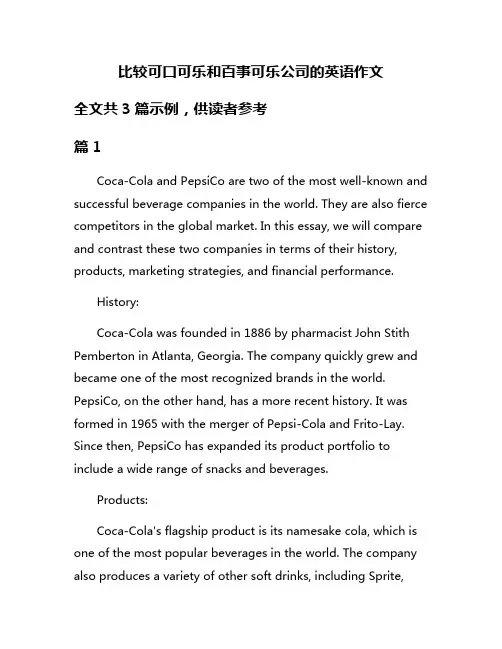
比较可口可乐和百事可乐公司的英语作文全文共3篇示例,供读者参考篇1Coca-Cola and PepsiCo are two of the most well-known and successful beverage companies in the world. They are also fierce competitors in the global market. In this essay, we will compare and contrast these two companies in terms of their history, products, marketing strategies, and financial performance.History:Coca-Cola was founded in 1886 by pharmacist John Stith Pemberton in Atlanta, Georgia. The company quickly grew and became one of the most recognized brands in the world. PepsiCo, on the other hand, has a more recent history. It was formed in 1965 with the merger of Pepsi-Cola and Frito-Lay. Since then, PepsiCo has expanded its product portfolio to include a wide range of snacks and beverages.Products:Coca-Cola's flagship product is its namesake cola, which is one of the most popular beverages in the world. The company also produces a variety of other soft drinks, including Sprite,Fanta, and Diet Coke. In addition, Coca-Cola has expanded into other categories such as water, juices, and energy drinks. PepsiCo's main product is Pepsi-Cola, but the company also offers a range of other beverages, such as Mountain Dew, Gatorade, and Tropicana. In addition, PepsiCo's snack brands, including Lay's, Doritos, and Quaker, are also very popular.Marketing Strategies:Both Coca-Cola and PepsiCo are known for their innovative marketing strategies. Coca-Cola has a long history of iconic advertising campaigns, such as the "Share a Coke" campaign and the "I'd Like to Buy the World a Coke" commercial. PepsiCo, on the other hand, has focused on celebrity endorsements and sponsorships, such as its partnership with Beyoncé and its sponsorship of the Super Bowl halftime show.Financial Performance:Both Coca-Cola and PepsiCo are highly profitable companies. Coca-Cola's revenue in 2020 was $33 billion, with a net income of $7.9 billion. PepsiCo's revenue in 2020 was $70 billion, with a net income of $7.1 billion. While PepsiCo's revenue is higher, Coca-Cola's profit margin is slightly better.In conclusion, Coca-Cola and PepsiCo are two of the most successful beverage companies in the world. They have a long history of innovation and success, and continue to be leaders in the global market. While they have some differences in terms of their products and marketing strategies, both companies have proven to be highly profitable and successful.篇2Comparison of Coca-Cola and PepsiCoIntroduction:Coca-Cola and PepsiCo are two of the largest and most well-known beverage companies in the world. They both have a long history and a strong presence in the global market. In this essay, we will compare and contrast the two companies in terms of their history, products, marketing strategies, financial performance, and social responsibility.History:Coca-Cola was founded in 1886 by pharmacist John Pemberton in Atlanta, Georgia. The company has a long history of success and innovation, with iconic products such asCoca-Cola, Diet Coke, and Sprite. PepsiCo, on the other hand, was founded in 1898 by Caleb Bradham in New Bern, NorthCarolina. The company's product line includes Pepsi, Mountain Dew, and Gatorade, among others. Both companies have grown significantly over the years through mergers, acquisitions, and strategic partnerships.Products:Coca-Cola and PepsiCo both offer a wide range of beverages, including carbonated soft drinks, juices, energy drinks, and water. Coca-Cola has a strong presence in the carbonated soft drink market, with brands such as Coca-Cola, Fanta, and Dr Pepper. PepsiCo, on the other hand, has a diverse product portfolio that includes beverages, snacks, and even breakfast items. Both companies are constantly introducing new products to meet changing consumer preferences.Marketing Strategies:Coca-Cola and PepsiCo are known for their iconic marketing campaigns and sponsorships. Coca-Cola is famous for its "Share a Coke" campaign and its sponsorship of major sporting events such as the FIFA World Cup. PepsiCo, on the other hand, has collaborat ed with popular celebrities such as Beyoncé and Britney Spears to promote its products. Both companies invest heavily in marketing and advertising to build brand awareness and loyalty.Financial Performance:Coca-Cola and PepsiCo are both publicly traded companies with strong financial performance. Coca-Cola's revenue in 2020 was $33 billion, while PepsiCo's revenue was $70 billion. Both companies have profitable operations in markets around the world and have consistently delivered strong financial results to their shareholders.Social Responsibility:Coca-Cola and PepsiCo are committed to social responsibility and sustainability. Coca-Cola has initiatives such as "World Without Waste" to reduce plastic waste and "5by20" to empower 5 million women entrepreneurs by 2020. PepsiCo has initiatives such as "Performance with Purpose" to reduce its environmental footprint and promote healthier snacks and beverages. Both companies have received recognition for their efforts to support local communities and protect the environment.Conclusion:In conclusion, Coca-Cola and PepsiCo are two of the largest and most successful beverage companies in the world. They have a long history of innovation and strong brand recognition. Whilethey compete fiercely in the market, they also share a commitment to social responsibility and sustainability. Both companies will continue to drive growth and innovation in the beverage industry for years to come.篇3Coca-Cola and Pepsi are two of the most popular andwell-known soda companies in the world. While they both produce similar products, they have distinct differences in terms of their history, branding, and market strategies. In this essay, we will compare and contrast Coca-Cola and Pepsi to showcase their unique qualities.Firstly, let's take a look at the history of Coca-Cola and Pepsi. Coca-Cola was invented by Dr. John Pemberton in 1886 in Atlanta, Georgia. The drink quickly became a popular choice among consumers and has since grown into a global brand. On the other hand, Pepsi was created by Caleb Bradham in 1893 in New Bern, North Carolina. Originally called Brad's Drink, Pepsi rebranded and became Pepsi-Cola in 1898. Both companies have a long-standing history in the soda industry and have continued to innovate and evolve over the years.In terms of branding, Coca-Cola and Pepsi have distinct identities that appeal to different audiences. Coca-Cola is known for its classic red and white logo, as well as its iconic polar bear and Santa Claus campaigns. The company's branding emphasizes tradition, nostalgia, and happiness, which resonates with consumers all over the world. On the other hand, Pepsi has a more modern and youthful image, with a blue and red logo and a focus on celebrity endorsements and pop culture. Pepsi's branding is edgier and more dynamic, targeting a younger demographic.Additionally, Coca-Cola and Pepsi have different marketing strategies when it comes to their products. Coca-Cola focuses on brand loyalty and consistency, with its classic Coke and Diet Coke varieties being the top-selling products. The company also offers a wide range of other beverages, including Sprite, Fanta, and Dasani water. In contrast, Pepsi has a more diverse product portfolio, with Pepsi-Cola, Mountain Dew, Gatorade, and Tropicana among its popular offerings. Pepsi is known for its innovative and creative marketing campaigns, which often incorporate music, sports, and entertainment.Overall, Coca-Cola and Pepsi are two of the biggest players in the soda industry, with their own unique strengths andweaknesses. While Coca-Cola is known for its timeless branding and strong brand loyalty, Pepsi appeals to a younger audience with its dynamic marketing strategies and diverse product offerings. Regardless of which soda you prefer, it's clear that both companies have made a lasting impact on the beverage industry and continue to be influential brands in the market.。
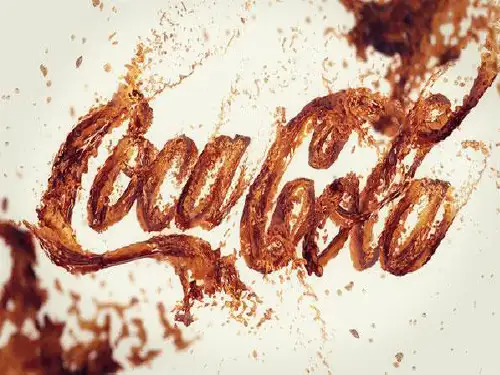
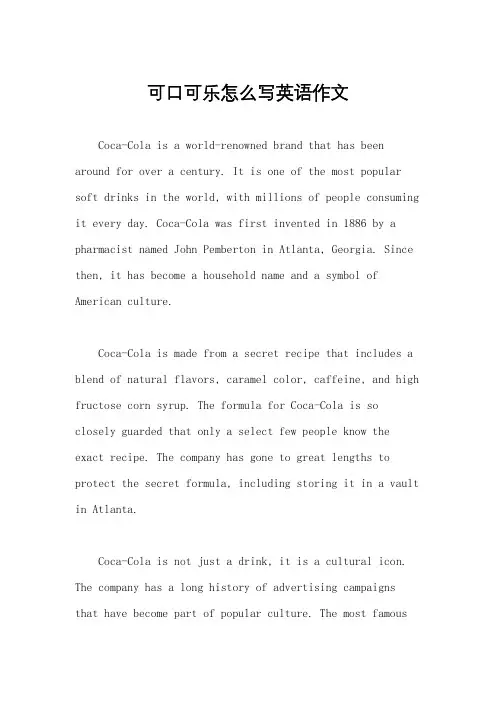
可口可乐怎么写英语作文Coca-Cola is a world-renowned brand that has been around for over a century. It is one of the most popular soft drinks in the world, with millions of people consuming it every day. Coca-Cola was first invented in 1886 by a pharmacist named John Pemberton in Atlanta, Georgia. Since then, it has become a household name and a symbol of American culture.Coca-Cola is made from a secret recipe that includes a blend of natural flavors, caramel color, caffeine, and high fructose corn syrup. The formula for Coca-Cola is so closely guarded that only a select few people know the exact recipe. The company has gone to great lengths to protect the secret formula, including storing it in a vault in Atlanta.Coca-Cola is not just a drink, it is a cultural icon. The company has a long history of advertising campaignsthat have become part of popular culture. The most famousof these campaigns is the "Share a Coke" campaign, which began in 2011. The campaign encouraged people to share a Coke with friends and family, and it was a huge success. The company also sponsors major sporting events, such as the Olympics and the FIFA World Cup.Coca-Cola has had its fair share of controversies over the years. One of the most significant was the "New Coke" debacle in 1985. The company changed the formula for Coca-Cola, and it was met with a huge backlash from consumers. The company quickly reversed the decision and went back to the original formula.Despite the controversies, Coca-Cola remains one of the most popular soft drinks in the world. The company continues to innovate and create new products, such as Coca-Cola Zero and Diet Coke. Coca-Cola has also expanded its product line to include other beverages, such as Sprite and Fanta.In conclusion, Coca-Cola is not just a soft drink, itis a cultural icon. The company has a long history ofinnovation and advertising campaigns that have become part of popular culture. Despite its controversies, Coca-Cola remains one of the most popular soft drinks in the world.。
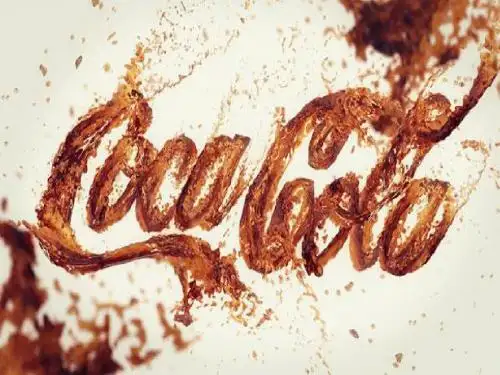
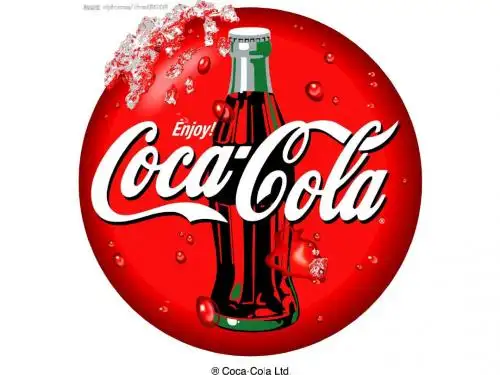
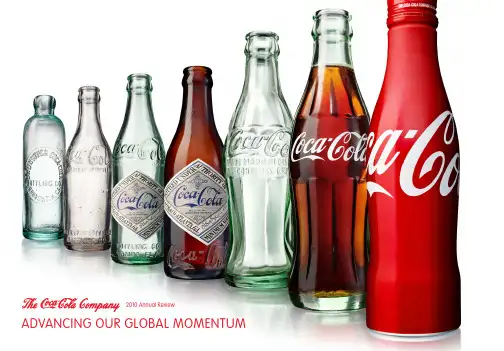
2010 Annual Review AdvAncing ouR globAl MoMentuM2 letter to shareowners5 selected financial data6 125th Anniversary8 2010 highlights10 per capita consumption12 Momentum in north America 14 growing our Juice business16 expanding our beverage portfolio18 engaging with consumers20 doing business sustainably22 2010 operating group highlights26 business profile28 Management30 board of directors31 shareowner information32 company statements33 2020 vision goalsWe began serving a delicious and refreshing sparkling beverage 125 years ago in Atlanta, georgia. With that first moment of refreshment came a thirst for more that continues to this day. We now have more than 500 brands and 3,500 beverage products and sell 1.7 billion servings per day in over 200 countries. We are growing our reach, strengthening our brands and advancing our global momentum, every moment of every day.2 the coca-cola companyDear Fellow ShareownerS:this past year, i had the privilege of visiting our coca-cola operations in 17 countries on four continents. during my travels with our associates around the world, we opened new bottling plants, visited research and development centers, worked with retailcustomers, met with consumers and suppliers, and collaborated with an assortment ofamazing leaders from business, government and civil society. from the bustling cities of china to the remote villages of south Africa, i walked away with one overriding impression of the coca-cola company. What i saw and continue to see in the second decade of the 21st century is a company that is steadily and strategically advancing its momentum all around the world.Working with our nearly 300 bottling partners, we added more than 1 billion incremental unit cases of volume to our business in 2010. our unit case volume grew 5 percent, and we exceeded our long-term growth target for unit case volume and operating income.Trademark Coca-Cola, the lifeblood of our business, accounted for nearly 400 million unit cases of incremental volume, the largest incremental growth we have seen since 2007. in addition, Minute Maid Pulpy,a juice drink that was developed just five years ago in china, grew into our 14th brand to achieve annual retail sales of more than $1 billion.in 2010, our company generated $9.5 billion in cash from operations, up 16 percent over 2009. We returned $7.2 billion to our shareowners by repurchasing $3.1 billion in company stock and paying $4.1 billion to shareowners through dividends. in fact, we have increased our annual dividend payments for 49 consecutive years.winning TogeTher wiTh our BoTTling ParTnerSone of the most important ways we have advanced our momentum around the world has been our ability to work together with our global bottling partners in support of our shared 2020 vision, which we unveiled in 2009. Collectively, we own, inspire and drive our 2020 Vision every single day.this disciplined, systemwide execution is already showing significant results. in 2010, we grew daily servings of our beverages to 1.7 billion. at the same time, system revenues have grown to more than$100 billion. We have also made some big, bold decisions along the way, including a commitment to more than $25 billion in new system investments over the next five years in markets around the world.creating value with our bottling partners also means capturing the hearts and minds of our consumers, customers, associates, communities and other stakeholders who honor us by inviting us into their lives each day. As stewards of the world’s most valuable brand, we feel a deep responsibility to ensure all the work we are doing across the sustainability spectrum is creating tangible value for our system and for the communities we serve.from helping rebuild haiti’s farmingindustry to empowering 5 million women entrepreneurs across our value chain by 2020, our sustainability efforts arecentral to our 2020 Vision of doublingour business in the next 10 years.a leTTer FroM our ChairMananD ChieF exeCuTiVe oFFiCera gloBal PiCTure oF SuCCeSSAs you will see in the pages to follow, our business and our brands are stronger and growing around the world. in 2010, we gained volume and value market share globally, as well as in both our north America and international operations.our sparkling beverage business is growing in every operating group around the world. nowhere is it growing faster, however, than in our eurasia & Africa group, where, in 2010, Trademark Coca-Cola volume increased9 percent and Sprite volume increased14 percent.one of the most exciting sparkling beverage developments in our eurasia & Africagroup is russia’s recent success withbrand coca-cola. our flagship brand grew 26 percent in 2010, representing our largest ever year-over-year incremental volume growth in Russia.not too long ago, cynics were dismissing europe as a market of diminishing returnsfor sparkling beverages. however, the reality is just the opposite. even in the recent challenging economic conditions, trademark Coca-Cola is growing across our europe group, buoyed by new recruitment strategies for brand coca-cola, new innovative packaging designs and marketing for coca-cola light, and the continued momentum of coca-cola Zero.our still beverage portfolio is growingglobally as well. in our latin America group,for example, two of our biggest growth starsare del valle and leão. Del Valle is now theleading juice drink brand in the region,while leão commands a leading positionin the important brazilian ready-to-drinktea category.We have also made great progress withour still beverage portfolio across ourPacific group, especially with the addition ofMinute Maid Pulpy. this exciting new juicedrink is unique to our portfolio of billion dollarbrands in at least one important way. it wasour first billion dollar brand launchedfrom an emerging nation—China.What is equally impressive is that it took justfive years to achieve billion dollar status.Minute Maid pulpy is a great example offast and effective innovation transfer,as it has spread from china and is now apremier juice drink brand in 19 marketsaround the world and counting.norTh aMeriCafor the last two years, i have been sayingthat restoring north America to its rightfulplace as a center of growth and innovationis a top priority for the coca-cola company.Quite frankly, it makes good business sense.over the next 10 years and beyond, theunited States will have some of theworld’s most attractive demographicsfor our business. by 2020, the united stateswill add about 31 million people, and itsteen population will also be around31 million. only india and china willhave larger teen populations.When you factor in this growing, young,diverse and vibrant population, an innovation-and entrepreneurial-based economy, and aheritage of reinvention, you can see why weremain very bullish on north America.in 2010, we began executing one ofthe largest vertical integrations inu.S. history when we announced thatthe coca-cola company would acquire theentire north American business of coca-colaenterprises inc. (cce), which accounted forapproximately 75 percent of u.s. bottler-delivered volume and almost 100 percentof canadian bottler-delivered volume.Amid this effort, our north america groupdelivered organic volume growth for eachof the last three quarters of 2010. We grewvolume and value market share, increasedbrand loyalty and saw stronger share in thevery important chilled sparkling beverageimmediate-consumption channel.our plan for continued growth starts with ourstrong brands. our focus is on acceleratingprofitable growth and share within the2010 Annual Review 3sparkling beverage category, led by trademark coca-cola. Today, in north america we command the top twosparkling beverages in brand Coca-Cola and brand Diet Coke. At the same time,we are moving aggressively to increasethe value of our still portfolio, particularly in fast-growth categories like ready-to-drink tea, coffee and enhanced water. And we are strengthening our innovation pipelineto develop and deploy new packagingand equipment.STory BehinD The nuMBerSAround the world, there is a more powerful story than just the numberson a financial statement.it is what i see—and what our people see—every day in the market. it is a world yearning not just for the beverages we provide but for the ideals and values we represent—ideals like community, fun, happiness and the hope for a better tomorrow.i have seen these ideals play out firsthand, hundreds of times, in all corners of the globe. last year, i was in hohhot, a city in inner Mongolia, to help open a new bottling plant. hohhot sits in the heart of china’s dairy country, where the nation’s northern grasslands meet the edge of the gobi desert. there is an indescribable beauty to the landscape and a palpable sense of enterprise among its people, many of whom share much more in common culturally andhistorically with central Asia than with coastalchina. like much of rural china, it is a regionin transition as china’s government triesto open its isolated northern and westernfrontiers for greater development and trade.While i was there, i sensed from talkingto government leaders, shopkeepers andfamilies of our associates that this wasa community in which they believed—acommunity of tremendous promise anda place destined for a better tomorrow.And, of course, they wanted Coca-Colato be part of their future.our plant opening in hohhot had theatmosphere of a fifA World cup™ match.it was a significant moment in hohhot’shistory—a moment i will never forget. wehave witnessed similar stories playingout in places like afghanistan, egypt,haiti, iraq, Pakistan and ramallah, inthe Palestinian territories, and dozensof nations around the world. in theseplaces, and so many others, we sense theoptimism and the belief that a better dayis coming—not just a better business daybut a better day for society, communitiesand humanity.we have always believed that Coca-Colarepresents that optimism, that magicalforce that underscores and celebratesour humanity. And we wholeheartedlybelieve that is our secret formula.125 anD BeyonDThis year—on May 8 to be exact—wecelebrate the 125th anniversary of oneof the world’s greatest consumer productinnovations—Coca-Cola. As we mark thismilestone, we see a company and a systemshaped by its youth and not its age. We seea company and an industry with incrediblepossibilities. And we see one unified system,guided by 700,000 of the world’s greatestpeople and aligned behind one compellingand achievable vision.We look forward to continuing this excitingjourney with you. And most of all, we thankyou for your support and investment in ourcompany. Your trust and confidence in thefine women and men of coca-cola are whatwake us up in the morning and fuel us lateinto the night. Rest assured we will continueto work tirelessly to protect and grow thevalue of your investment in our Company.My sincerest gratitude,MuhTar KenTchairman of the board of directorsand chief executive officerMarch 31, 20114the coca-cola companySeleCTeD aS rePorTeD FinanCial DaTaanD PerForManCe aT-a-glanCeneT oPeraTing reVenueS(in millions)2008200920101 $31,944$30,990$35,119neT inCoMe(in millions)2008200920101 $5,807$6,824$11,809uniT CaSe VoluMe(in billions)200820092010123.724.425.5oPeraTing CaSh Flow(in millions)2008200920101$7,571$8,186$9,5321i ncludes the impact of the company’s acquisition of coca-cola enterprises inc.’s north American business and the sale of our norway and sweden bottling operations, which closed on october 2, 2010Year ended december 31,20101200920082007(in millions except per share data)SuMMary oF oPeraTionSnet operating revenues$35,119$30,990$31,944$28,857operating income8,4498,2318,4467,252net income attributable to shareownersof the coca-cola company11,8096,8245,8075,981Per Share DaTabasic net income$5.12$2.95$2.51$2.59diluted net income 5.06 2.93 2.49 2.57cash dividends 1.76 1.64 1.52 1.36BalanCe SheeT DaTatotal assets$72,921$48,671$40,519$43,269long-term debt14,0415,0592,7813,2772010 Annual Review 56the coca-cola companyshare a coke, share thein 1886, dr. John pemberton created a great-tasting beverage that was first served as a fountain drink at Jacobs’ pharmacy in downtown Atlanta, georgia. the business started small, with a modest nine drinks served per day.our success with coca-cola ® began by spreading the word.Asa candler, an Atlanta businessman, drove coca-cola’s popularity through unique marketing approaches, many of which are still used today. through his use of coupons and coca-cola-branded souvenir fans, calendars, clocks and urns, candler pioneered ways of promotingthe company brand. in 1899, benjamin thomas and Joseph Whitehead from chattanooga, tennessee, gained the rights to bottle coca-cola and laid the groundwork for the unrivaled coca-cola bottling and distribution system the world knows today.in the 1920s, Robert Woodruff, president of the coca-cola company, envisioned global expansion for coca-cola and developed a separate organization within the company specifically designed to market and sell coca-cola outside the united states. by 1930, coca-cola was bottled in 27 countries.2010 Annual Review7to learn more about our company and to view A Short History of The Coca‑Cola Company, go to the “heritage” section at www.thecoca‑ .momentumsubsequent years brought continued product expansion, particularly when the company dispatched 64 portable bottling plants to quench the thirst of u.s. troops during World War ii. these plants, which were sent to europe and eventually to Africa and the pacific, enabled the company to comfort the troops with coca-cola—a reminder of home—and create a foundation for growing our business internationally. over the years, as coca-cola gained popularity worldwide, consumer demand for new products and packaging emerged, and our beverage portfolio grew. We created low- and no-calorie sparkling beverages,juices and juice drinks, waters, sports and energy drinks, teas, coffees and dairy-based beverages to meet the preferences and needs of our consumers. to promote these beverages, we continue to use traditional forms of media—radio, print and television advertising—and todaycombine those with emerging media such as social, mobile and gaming. 2011 marks the 125th anniversary of coca-cola, and we see opportunities as exciting as those our predecessors must have seen back in 1886. together with our global bottling partners, our journey is just beginning, and we see a bright future ahead in the next 125 years.grew worldwide volume 5%, led by Coca-Cola.Welcomed 1.1 million guests from around the globe to the World of coca-cola in Atlanta, georgia, exceeding our attendance expectations against the backdrop of continuing economic challenges facing consumers.2010 CoMPany anD CoCa-Cola SySTeM highlighTScontinued to roll out coca-cola freestyle units in more than 200 restaurants and attractions throughout the united states. by the end of 2010, these next-generation dispensers, which offer 106 individual drink choices while eliminating 30% of water and packaging from the supply chain, were availablereceived a prestigious DuPont award for Packaging innovation for our Company’s PlantBottle ™ polyethylene terephthalate (PeT) package, the first plastic beverage bottle in the marketplace today made from up to 30% plant-based material that is fully recyclable. PlantBottle also won the 2010 Design for recycling award from the institute of Scrap recycling industries, inc.launched Minute Maid nutriBoost ™ in Vietnam (locally known as Minute Maid nutri ngon-Khoe). This great-tasting dairy and juice drink, primarily targeted at young adults who enjoy an active and healthy lifestyle, is fortified with essential nutrients.created the 111 navy chair, the result of a partnership between our company and the furniture manufacturer emeco, by combining 111 recycled pet plastic bottles and other materials, including pigment and glass fiber, for strength. going forward, it is estimated that more than 5 million pet plastic bottles will be repurposed annually for the production of 111 navy chairs. in addition to chairs, our growing recycled pet retail merchandise includes bags, caps, notebooks and t-shirts.2010 Annual Review9completed expedition 206,in which three young “happiness ambassadors” visited 186 of the 206 countries where coca-cola is sold, seeking stories of happiness and documenting their voyage via facebook ™, Youtube ™, twitter ™, flickr ™ and a blog.added i lohaS ™ Mikan, asparkling beverage made with Japanese natural spring water and extract from the satsuma mandarin, a domestically produced fruit popular throughout Japan, to thei lohaS mineral water brand.Celebrated the fifth anniversary of Coca-Cola Zero ™,which is now availablein more than 130 countries.Maintained our leadership as the world’s largest juice and juice drink company, selling nearly 2 billion unit cases of juice and juice drinks across more than 70 brands.Achieved billion dollar brand status for Minute Maid pulpy ™ just five years after its initial launch in china. it surpassed retail sales of $1 billion and became our company’s 14th billion dollar brand.introduced odwalla ™ heart health superfood,a berry blend that contains 0.4 grams of plant sterols, naturally sourced from plant extracts, which may help reduce cholesterol and support cardiovascular health.Made our presence carbon neutral for the Vancouver 2010 olympic winter games by offering 100% commercially compostable beverage cups, debuting our PlantBottle packaging and deploying hFC-free coolers and vending equipment. we also used 126 PeT plastic bottles for each of the 600 Coca-Cola associate olympic games uniforms, totaling 75,600 recycled bottles.Placed more than 160,000 units with hydrofluorocarbon (hFC)-free refrigeration systems in 2010 for a total of more than 275,000 units placed since 2004. Since 2006, we have installed more than 3.5 million intelligent energy management devices that reduce energy consumption by monitoring the energy use of our refrigeration units. we also have investedmore than $60 million since 2000 in research and development to advance the use of climate-friendlycooling technologies.launched hugo ™ in peru and Argentina, a dairy and juice drink that combines milk and fruit nectar in three new flavors—banana-orange, peach and cherimoya-orange. the flavors offer refreshing, creamy combinations that satisfy consumers’ tastes.10 the coca-cola companyPer CaPiTaConSuMPTion oF CoMPany BeVerage ProDuCTSto measure our growth potential, we look to our per capita consumption—the average number of 8-ounce servings of our beverages consumed each year in a given market. it is predicted that by the year 2020, the world will have nearly 1 billion more people whose disposable incomes will afford them choices and opportunities unthinkable a generation ago. We must discover innovative ways to connect with our traditional consumer base and this emerging global middle class—by creating new products and packaging formats forall lifestyles and occasions.89 servings consumed per person worldwide in 20102010 ConSuMPTion SnaPShoT 1111213152834546969848994125139143144159166178179193204221229236254255258284318319394445606675india Maliindonesia pakistan nigeria china egypt Russiasouth Korea Morocco Worldwide thailand colombia italy france philippines turkey el salvador Japan germany perugreat britain bolivia brazil canada south Africa Austria panama spain Argentina Australia united states chile Malta Mexico1b ased on u.s. 8 fluid ounces of a finished beverageAdvAncing ouRglobAl MoMentuMfor 125 years, we have looked for innovative ways to supplement our beverage portfolio by anticipating and meeting our consumers’ preferences and needs. We continue to grow in tough economic times and playa leadership role in driving sustainable, environmentally responsible business practices in the communities where we operate.Diet Coke™ is no. 2 diet coke is now the no. 2 sparkling beverage brand in the united states behind our flagship brand, coca-cola. important moments in our 125-year history: We introduced the first automatic soda fountain dispenser in 1933at the chicago World’s fair.Moments of refreshmentWe serve coca-cola nearly 200 million times a day in north America.north America, our flagship market, is a developed market with significant opportunities for long-term growth, driven by a large and growing population and strong disposable income.our plans for growth start with strong brands.We are focused on accelerating expansion and share in the sparkling beverage category, led by coca-cola, while increasing the value of our still beverage portfolio and strengthening our innovation in brands, packaging and equipment. Within the sparkling beverage category, we are engaging with teens and moms in new and exciting ways to reinforce the connection they have with our brands. And within our still beverage portfolio, we are building strong brands for today and tomorrow, such as glacéau™, powerade™ and simply.We are also transforming our ability to translatethe value of our brands into value for our customers. on october 2, 2010, we completed the acquisitionof the north American operations of coca-cola enterprises inc.— a move designed to help us sustainably grow volume, profit and share in line with our 2020 vision; bring to life the passion and power of each brand in our north American portfolio;deliver significant cost and revenue synergies;operate a fully integrated, world-class supply chainthat is a global leader in quality, customer service,safety and sustainability; and further enhance asystem that embodies a growth-oriented, externallyfocused and customer-driven environment.our newly formed north American business system,consisting of coca-cola Refreshments and coca-colanorth America, will operate with distinct capabilities,responsibilities and strengths and is expected todeliver at least $350 million in annual synergiesby the end of 2014.We believe the reshaping of our north Americanbusiness will help us achieve our strategy of creatingcapabilities that enable us to sustain and repeatour success.We are implementing best practicesfrom our global system and developing a disciplined,proven execution approach to create a distinctcompetitive advantage across our business, fromcutting-edge marketing and in-market executionto world-class procurement, product supply andcustomer service.in the next 10 years, the u.S.teen population will become thethird largest in the world, afterindia and China. using digitalplatforms, we are well-equippedto capture opportunities withinthis growing segment.growing the business in north America isessential to the future of our company.2010 Annual Review 13launch of Minute Maid Kids Tropical™Minute Maid Kids tropical, introduced in tunisia, is fortified with vitamins and made from the juice of five fruits: orange, pineapple,apple, peach and mango.important moments in our 125-year history: the coca-cola company acquired the Minute Maid corporation in 1960, addinga line of juice products toour portfolio.world’s largest juice andjuice drink companythe coca-cola company is the world’s largest ready-to-drink juice and juice drink company, with nearly twice the market share we had 10 years ago.the juice and juice drink category is a fast-growing and dynamic segment of nonalcoholic ready-to-drink (nARtd) beverages. We recognize consumers drink juice to enjoy the great taste and receive the benefits of fruit and natural nutrition. to meet their needs, we offer a range of more than 1,000 products, including juices, nectars, juice drinks and smoothies, made from a variety of fruits sourced from all over the world.for our juice business, our strategy centers on a combination of organic growth, strategic acquisitions and innovative products and packaging. the packaging for many of our brands, such as Minute Maid™,del valle™, cappy™ and cepita™, shares a common look and feel, which creates a universal product experience for our consumers. through more recent acquisitions and investments in dynamic companies, such as Jugos del valle, Multon, nidan and innocent, and with strong organic growth in brands such as Minute Maid and Minute Maid pulpy, odwalla, Maaza™ and simply, we are able to offer a wide variety of options, each of which is tailored to the preferences and needs of consumers in individual markets.our juice business depends on a variety of natural ingredients. to ensure the health of our productsand longevity of our business, we are doing our part to support agricultural initiatives to reduce costs, improve ingredient quality and promote sustainable practices. one example of our agricultural advocacy is our work to eradicate huanglongbing, also known as citrus greening—one of the most destructive citrus crop diseases, which ravages the productive capacity of citrus trees. together with sucocitrico cutrale of brazil, we have committed to donate a combined$3 million to the university of florida foundation to support research projects designed to protect the health of citrus groves.We are continuing to meet the needs ofconsumers by growing our juice business.in March 2010, we announced thehaiti hope Project in partnershipwith the Multilateral investmentFund of the inter-americanDevelopment Bank (iDB), theu.S. agency for internationalDevelopment (uSaiD) andTechnoServe. This five-year,$9.5 million partnership createsopportunities for haitian mangofarmers and their families. Theinitiative seeks to double thefruit incomes of 25,000 farmersand improve local mango farmingcapacity, thereby promotingeconomic growth and sustainabledevelopment. in January 2011,odwalla launched haiti hopeMango Tango to replace haitihope Mango lime-aid andcommitted to donating 10 centsfor every bottle sold to the haitihope Project, up to $500,000per year of the initiative.2010 Annual Review 15$1 trillion industrythe nARtd beverage industry is expected to grow by 50 billion unit cases by 2020, on the way to becoming a $1 trillion industry. Coca-Cola Zero turns fivecoca-cola Zero’s fifth anniversary was celebrated with the launch of caffeine free coca-cola Zero™, which offers all the great taste of coca-cola, with zero sugar or caffeine. the product launched in france, Japan and spain, with future launches planned for belgium, luxembourg and the netherlands.no. 1the coca-cola company is the number-one provider of sparkling beverages, juices and juice drinks, and ready-to-drink teas and coffees in the world.low- and no- calorie beverages More than 800 beverages—nearly 25% of our product portfolio—are low- orno-calorie.our 14 billion dollar brands coca-cola, diet coke, coca-cola Zero, sprite™, fanta™, Minute Maid, powerade, Aquarius™, dasani™, vitaminwater™, georgia™, sokenbicha™, simply and Minute Maid pulpy。
介绍可口可乐公司的英语作文英文回答:The Coca-Cola Company is a global beverage company that produces, markets, and distributes non-alcoholic beverages. It is headquartered in Atlanta, Georgia, and operates in over 200 countries. The company's flagship product is Coca-Cola, which was invented in 1886 by John Stith Pemberton. Coca-Cola is now the world's most popular soft drink and is sold in more than 200 countries.In addition to Coca-Cola, the company also produces a variety of other beverages, including Diet Coke, Sprite, Fanta, and Dasani. The company also owns and operates a number of bottling plants and distribution centers around the world.Coca-Cola is one of the most recognizable brands in the world and is estimated to be worth over $80 billion. The company has been a target of criticism for its marketingpractices and its use of sugar in its beverages. However, the company remains a popular choice for consumers and continues to generate billions of dollars in sales each year.中文回答:可口可乐公司是一家全球饮料公司,生产、销售和分销非酒精饮料。
可口可乐介绍作文英语英文:Growing up, I have always been a huge fan of Coca-Cola. The refreshing taste and the iconic red and white logo have always been a part of my life. Whether I was at a family barbecue or hanging out with friends, Coca-Cola was always the drink of choice. 。
Coca-Cola, also known as Coke, is a carbonated soft drink produced by The Coca-Cola Company. It was originally intended as a patent medicine when it was invented in the late 19th century by John Pemberton. However, it quickly became a popular beverage and has since become one of the most recognized and valuable brands in the world.One of the things I love most about Coca-Cola is its versatility. It can be enjoyed on its own, mixed with other drinks, or used as a mixer in cocktails. Its unique flavor profile and effervescence make it a great addition to anysocial gathering. Whether I'm sipping on a classic Coke at a party or enjoying a Coke float on a hot summer day, it always brings a sense of nostalgia and happiness.In addition to its great taste, Coca-Cola has also been involved in various marketing campaigns and sponsorships, such as the iconic "Share a Coke" campaign where bottles were personalized with popular names. This personalized touch made the brand even more relatable and engaging for consumers.Overall, Coca-Cola has played a significant role in my life and has been a staple beverage for me. Its rich history, refreshing taste, and cultural impact make it a timeless classic that I will continue to enjoy for years to come.中文:在我成长的过程中,我一直是可口可乐的忠实粉丝。